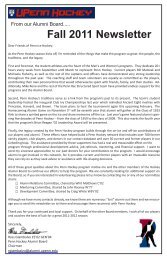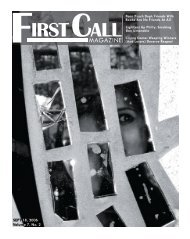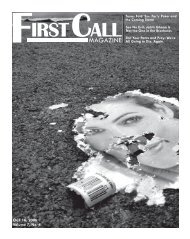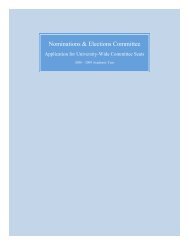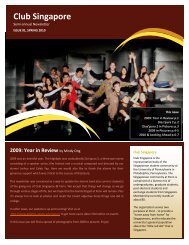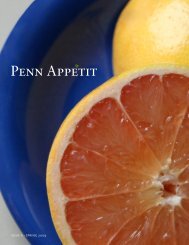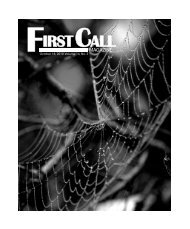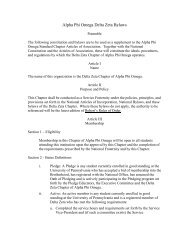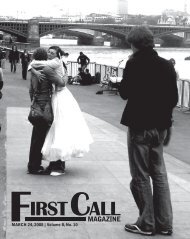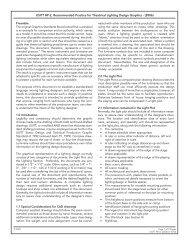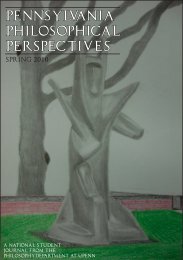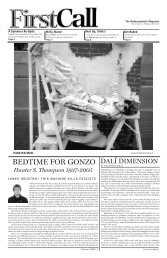Penn Philosophical Perspectives - University of Pennsylvania
Penn Philosophical Perspectives - University of Pennsylvania
Penn Philosophical Perspectives - University of Pennsylvania
- No tags were found...
Create successful ePaper yourself
Turn your PDF publications into a flip-book with our unique Google optimized e-Paper software.
would be unattainable, given that the possibility <strong>of</strong> improvingit by adding more and more things would be ever-present. Sat- istotleargues, that person can perceive nothing that could improvehis or her life. In this way, then, happiness is not just onegood thing to be counted among other good things; happinessIn order to determine what constitutes the good for man(i.e., man’s happiness), in The Nicomachean Ethicstion<strong>of</strong> man cannot be nutrition or perception in that these func-a function that pertains to man exclusively. The function <strong>of</strong>man, then, ins<strong>of</strong>ar as it pertains exclusively to man, must berelated in some way to “the life <strong>of</strong> the rational element” (sincein continuing with the discussion, uses an analogy involving alyre-player to demonstrate another point regarding the function<strong>of</strong> man. Just as the function <strong>of</strong> a good lyre-player is to playthe lyre well, the function <strong>of</strong> a good man is to exhibit a “good- some detail throughout the remainder <strong>of</strong> Nicomachean Ethics,tion<strong>of</strong> virtuous activity (also described in greater detail in thetreatise itself). In this way, then, human happiness is in directrelation with virtuous activity. The Stoics work largely fromthis same framework <strong>of</strong> happiness and virtue.<strong>Penn</strong> <strong>Philosophical</strong> <strong>Perspectives</strong>Aristotle, King Priam, and Blessedness chance <strong>of</strong> disaster that all living men face, it seems risky tocall any man happy (given that something could happen at anya living man happy, then who is happy? It seems strange andinherently problematic to call dead men happy ins<strong>of</strong>ar as deadmen cannot exhibit virtuous activity, a principle constituent <strong>of</strong>inga living man happy one runs the risks <strong>of</strong> “making the happyman out to be a ‘chameleon, and inherently based.’” This posesa problem because happiness is supposed to be something thatis lasting and not subject to constant change. It is the durable21). to be troubled by the situation <strong>of</strong> King Priam, the Trojan kingwho lost everything with the sack <strong>of</strong> his city during the Trojan-January 2010tion.For many thinkers, however, it seems wrong to suggestthat Priam could be the same both before and after the fall <strong>of</strong> hisblessedness,suggesting that instead <strong>of</strong> becoming unhappy as a result <strong>of</strong> badfortune with respect to external goods, Priam loses his blessed-condition in which one is both happy (i.e., living in accordancewith virtue) and fortunate (e.g. lucky enough to avoid chanceblessedness,if he meet with fortunes like those <strong>of</strong> Priam” (21).The Stoics on External GoodsIn On Final Endsistotle’smode <strong>of</strong> thought and that <strong>of</strong> the Stoics:The Peripatetics [i.e. the Aristotelians] thinkthat no life is completely happy without bodilywell-being. We Stoics could not agree less. Inour opinion not even an abundance <strong>of</strong> thosegoods which we really do call good makes a differenceto the happiness, desirability or value <strong>of</strong>one’s life. (Annas 332)It is not the case, however, that things such as health andwealth are <strong>of</strong> no concern to the Stoic. These things simplythings are not always good, given that their value depends, tosome degree, on the relevant circumstances, they are not thesame as moral virtue, which is always good (independent <strong>of</strong> thesituation at hand). Thus, things like health and wealth cannotvirtue in an attempt to improve one’s happiness. -to as either non-preferred or “preferred indifferents” (Inwood their respective circumstances allow. ternalgoods and virtuous activity is to regard the former as extrinsicallyvaluable (i.e., valuable in relation to something else)and the latter as intrinsically valuable (i.e., valuable by its veryyou check into a hotel and have the option to sleep in a dirty is, its value depends on the condition that, at this given time,the Stoics, is inherent. 24



